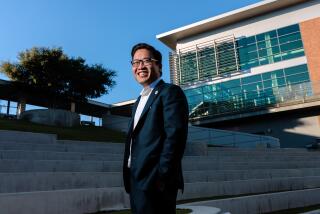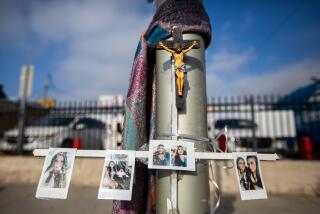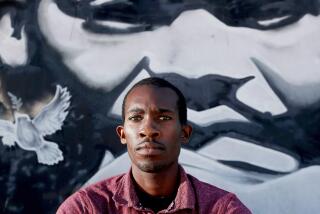Man Wins Court Round on His Conviction for Burglary : Race relations: Supporters, who see him as a symbol of blacks victimized by the legal system, cheer judge’s decision to delay sentencing.
- Share via
Because of a production error, portions of this story were published out of order in some editions of Wednesday’s Times. It is being reprinted here in modified form.
Flanked by nearly 100 supporters, community activist Jitu Sadiki won a round Wednesday in his fight to prove that he is innocent of charges that he broke into a Culver City beauty shop.
Sadiki was to be sentenced Wednesday--his 34th birthday--in Santa Monica Superior Court on one count each of burglary and attempted burglary.
But a crowd that included relatives, friends and scores of supporters erupted in applause when Judge David Perez delayed sentencing until Feb. 26, giving Sadiki’s new attorney time to prepare a motion for a new trial.
Perez, speaking through a court clerk, said that the large group of supporters in the courtroom did not influence his decision to delay the hearing, but it did impress Robert N. Harris, Sadiki’s newly acquired counsel.
“Do you believe in him?” one woman asked Harris in the moments after the continuance was granted.
“Yes I do,” answered Harris, who refrained from commenting on what grounds he would request a new trial pending a thorough review of Sadiki’s case.
“All right,” she said, staring him in the face. “I just wanted you to look me in the eye when you said that.”
The woman’s fierce dedication to Sadiki is typical of hundreds in the community who have gotten behind him: from the congregants of a Baptist church on Jefferson Boulevard, to the heads of the activist group Brotherhood Crusade, to football great Jim Brown.
Dozens of individuals and organizations have united to form a multiracial campaign--some call it an unprecedented effort--that has rallied behind Sadiki, who claims that his arrest and subsequent conviction for the Culver City burglary were unjust and racially motivated.
Sadiki’s supporters say it is not difficult to understand why they have rallied behind him. Those who know Sadiki say they find it hard to believe that a former convict who, since his release from prison in 1982, has adopted three sons (two age 6 and one age 3), been employed as a mechanic and become a dedicated community volunteer would jeopardize everything by breaking into a beauty salon.
But there is another, broader reason for this campaign, which has brought together Hollywood celebrities and grass-roots activists, some of whom barely know Sadiki. For them, he has become a symbol, a rallying point, for a problem they say has long plagued the African-American community.
They cannot dismiss Sadiki’s assertion that he is innocent when, they say, they have seen too many African-American men victimized by the criminal justice system simply because of the color of their skin. They list as evidence an incident in Boston in which a black man was unjustly accused of murdering a pregnant white woman, and another in Los Angeles in which members of the Nation of Islam became involved in violent clashes with law enforcement as recently as Tuesday.
Law enforcement authorities deny that Sadiki is a victim of bigotry, but his supporters are not convinced.
“It’s another case of a young black man being in the wrong place at the wrong time,” said David Lynn, former coordinator for the Police Misconduct Lawyer Referral Service and currently a partner in a private investigation firm looking into Sadiki’s case. “Anywhere a young black man is in Los Angeles, it’s the wrong place, the wrong time.”
Danny Bakewell, Brotherhood Crusade president, added: “People are just tired, and they’d like to see some justice.”
What began as a group of six or seven people, gathered in the wake of Sadiki’s November conviction to discuss raising funds for an appeal, has in less than three months grown into a network of hundreds. Volunteers have taken petitions to the streets of South Los Angeles and collected more than 2,000 signatures on Sadiki’s behalf.
And supporters have donated nearly $10,000 to his defense fund, according to those working on Sadiki’s behalf.
“I haven’t seen anything grow like this,” said Geri Silva, a member of Sadiki’s defense committee and director of the Los Angeles chapter of the Equal Rights Congress, which often receives complaints about alleged police abuse. “I’ve never gotten the calls or response that’s come to this case. It’s really touched a nerve.”
Small-business owners have printed--free of charge--the more than 16,000 flyers that have been distributed. Organizations from the Nation of Islam to the black entrepreneurial organization, Recycling Black Dollars, have provided forums in which Sadiki could solicit support for his cause.
Bakewell said he watched Sadiki walk the streets of a South Los Angeles neighborhood as part of his organization’s “Taking Our Community Back” campaign in August. “Any time I’ve ever seen Jitu it’s been doing something positive,” Bakewell said. “I almost feel he’s being persecuted because of his pride in himself and his community. Because he won’t roll over and be humble. I just believe the guy is a victim.”
Police believe otherwise.
Sadiki’s ordeal began July 24, 1988. Police contend that Sadiki was spotted inside a Culver City beauty salon, where, they say, he and another suspect were attempting to break into a pawnshop next door. Authorities think a relative of Sadiki was the other suspect but he was not caught and has never been questioned about the incident.
An officer chased Sadiki, according to police reports, catching up to him, at which time Sadiki allegedly tried to grab the officer’s gun. A struggle ensued in which both men fell to the ground, causing the officer’s gun to discharge. Other officers say they were forced to restrain Sadiki.
But what police termed restraint, Sadiki called abuse. He maintains that he was walking a woman he had just met in a bar to her car when he saw an officer chasing someone. He left the woman, whose last name he did not know, and walked over to see what was going on. At that point another officer began to run in his direction. Sadiki claims that he was shot at and subsequently ordered to lie on the ground, where he says he was beaten by officers. He was convicted Nov. 6 after a jury trial.
It was not his first felony conviction--he served six years in prison for the second-degree murder of a gang member and was released in 1982.
Deputy Dist. Atty. Todd L. Melnik, who prosecuted Sadiki’s most recent case, said that police testimony and photographs of the crime scene convicted Sadiki, not racism. “I think it’s ridiculous,” he said of the discrimination charge. “I don’t think it has anything to do with Mr. Sadiki’s being black. It was a normal routine burglary case except there was no physical evidence to present to the jury.” Authorities acknowledge that some of the evidence in the case was destroyed by mistake.
Culver City Police Lt. Ed Baughan said he was not denying that racial abuse does occur, but he called Sadiki’s campaign “just a smoke screen a convicted burglar is trying to use to keep out of jail, because he knows he’s going to do hard time. . . .
“Race is a hot topic right now,” Baughan added. “Allegations of police abuse toward black men make the front page.”
For many who have rallied behind Sadiki, however, justice--not race--is the issue.
“Take black out of it, he’s just another human being,” said Theodis Scott Jr., a businessman who made a small donation to Sadiki’s defense fund. “What kind of individual is going to adopt three sons and then turn around and rob something? I normally ignore things like this but this time, it’s obvious they got the wrong guy.”
Sadiki said that wherever he goes he talks about his case and the broader issue that he says has spawned it.
“In the black community when they see police, that brings about fear in most people’s hearts,” said Sadiki, who since his release from prison has spent much of his time working with gang youths. “Most people can relate to what I’m going through, having (had) a similar experience, or knowing someone who has.”
It is an experience that many black men encounter, said activist Don Jackson, whose crusade against alleged police abuse of black men garnered nationwide attention when a camera crew videotaped a Long Beach police officer apparently shoving his head through a window during what began as a routine traffic stop.
“Small cases like these, where the defendant doesn’t have any money, often slip through the system. That’s why it’s so important for us to rally around this one and stop it,” said Jackson, who has spoken out on Sadiki’s behalf. “Every time we fight back it makes a statement that we’re not going to roll over and be abused by the system.”
More to Read
Sign up for Essential California
The most important California stories and recommendations in your inbox every morning.
You may occasionally receive promotional content from the Los Angeles Times.













